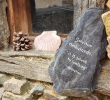pepi
Active Member
- Time of past OR future Camino
- Last: Sept 2022
next
Preface:
Moderators: I absolutely respect the rules of this forum - which I consider essential - and if this post, or reactions to it, go in the wrong direction, I ask you to delete it.
I don't want to discuss religion and faith, I'm just interested to know why other "non-believers" walk a "secular Camino" and if they had any problems; but especially if there are needs and wishes to do so. But let’s keep nastiness and spitefulness out of it, p-l-e-a-s-e.
After six long Camino walks, I still wonder: is there a secular Camino?
I love to hike, and I enjoy the conversations and camaraderie as much as the days of solitude and reflection on the Camino. In doing so, however, I by no means want to be categorized as a mundane hiker. As an agnostic/atheist, it fascinates me to watch the religious rituals, they are part of an occidental culture; for example, I never fail to stop at the small chapel in Rabanal with the Gregorian chants of the monks there; and attend Mass in SdC at the end for me is a respectful reference to those who make the Camino possible. I have a lot of admiration and gratitude for the faithful pilgrims who never - or very rarely - let me feel that I do not belong.
On the other hand, it strikes me, how many of my fellow Pilgrims spontaneouslyadmit stress that they go on pilgrimage "not for religious reasons". Thus I know that I am by no means the only one, possibly I even belong to a large group; if there were one, it would be a very silent one. I hope that respectful reports of experiences and opinions on this subject will be possible in this forum.
Moderators: I absolutely respect the rules of this forum - which I consider essential - and if this post, or reactions to it, go in the wrong direction, I ask you to delete it.
I don't want to discuss religion and faith, I'm just interested to know why other "non-believers" walk a "secular Camino" and if they had any problems; but especially if there are needs and wishes to do so. But let’s keep nastiness and spitefulness out of it, p-l-e-a-s-e.
After six long Camino walks, I still wonder: is there a secular Camino?
I love to hike, and I enjoy the conversations and camaraderie as much as the days of solitude and reflection on the Camino. In doing so, however, I by no means want to be categorized as a mundane hiker. As an agnostic/atheist, it fascinates me to watch the religious rituals, they are part of an occidental culture; for example, I never fail to stop at the small chapel in Rabanal with the Gregorian chants of the monks there; and attend Mass in SdC at the end for me is a respectful reference to those who make the Camino possible. I have a lot of admiration and gratitude for the faithful pilgrims who never - or very rarely - let me feel that I do not belong.
On the other hand, it strikes me, how many of my fellow Pilgrims spontaneously
Last edited:





























